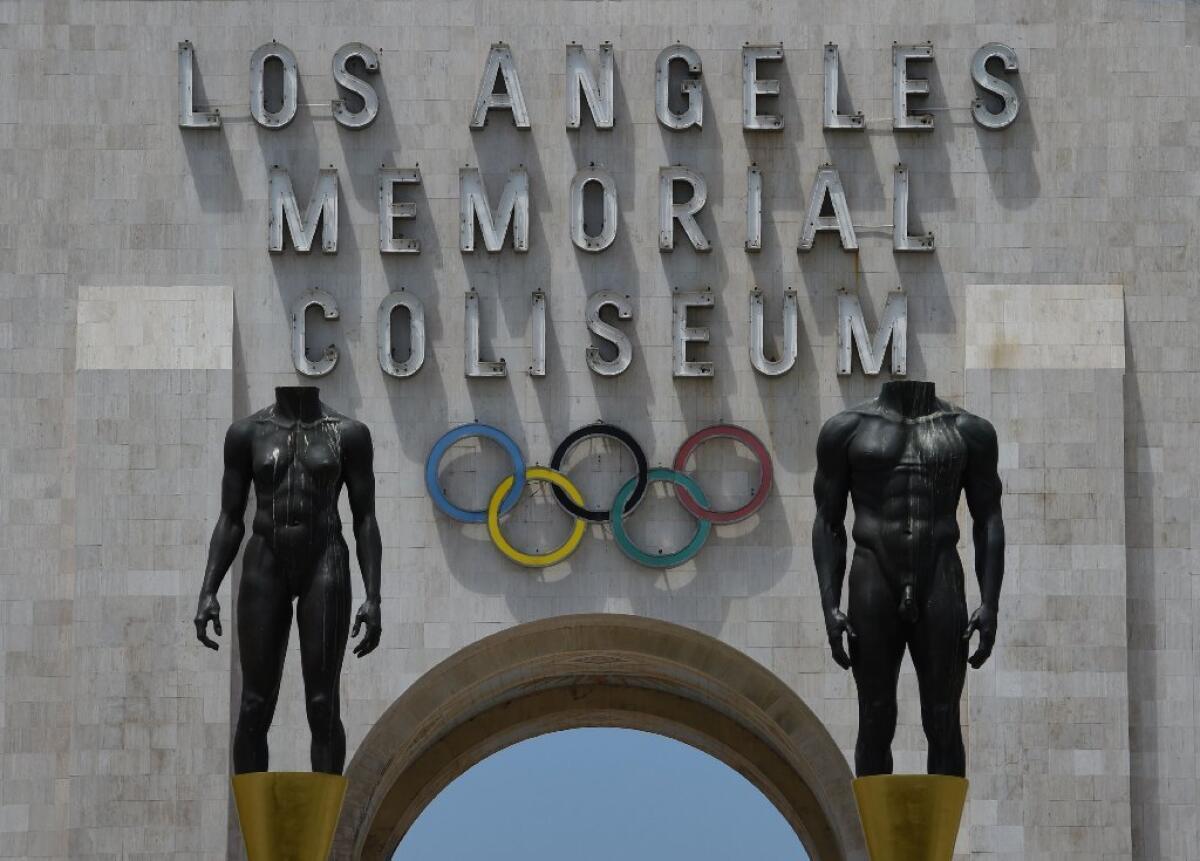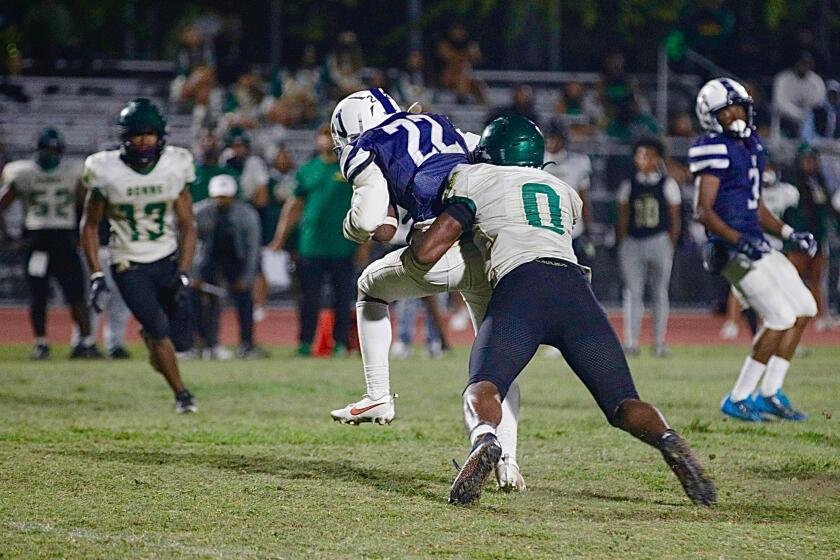U.S. Olympic Committee âvery optimisticâ about L.A. bid for 2024 Games

The Los Angeles Memorial Coliseum would serve as the main Olympic stadium if Los Angeles is named the host city for the 2024 Summer Olympics.
The chances of Los Angeles bidding for the 2024 Summer Olympics have never seemed better.
The U.S. Olympic Committee says it is âvery, very optimisticâ about naming the city as its official candidate at some point in the next few weeks. Mayor Eric Garcetti has been equally sanguine.
Both sides have reason to feel positive. Recent USOC polling showed 81% of area respondents favor bidding for the Games, a degree of public support that would impress International Olympic Committee voters.
âWe think L.A. gives us our best chance to win,â USOC Chief Executive Scott Blackmun said after his board of directors met at Denver International Airport on Wednesday.
Still, for Garcetti and the board to reach an agreement, key issues must be resolved.
âOver the past week, we have had very positive discussions with the United States Olympic Committee about how Los Angeles can present a strong and fiscally responsible bid on behalf of our city and nation,â Garcetti said in a statement. âI look forward to continuing our conversation.â
There are also questions about how the public will view the bid now that the mayor has announced it will cost a projected $4.1 billion. And that the city will be responsible for any unexpected cost overruns.
Los Angeles got back into the running for 2024 last month when the USOCâs original choice, Boston, withdrew because of low support. Poll numbers there had languished at about 40%.
Olympic officials renewed talks with Garcettiâs team and leaders from two other cities â San Francisco and Washington â that had sought be the American bidder.
Los Angeles quickly became the front-runner. If chosen, the city would have to sign an agreement governing its business arrangement with the USOC and a newly created, privately run bid committee.
The terms of the contract appear to be at the center of current negotiations.
Neither Garcetti nor USOC leaders would discuss specifics, but a similar contract signed by Boston during its recent campaign offers some idea of the issues that could be at stake.
The Massachusetts capital agreed to indemnify the USOC against any bid-related damages and comply with IOC requirements. It would include eventually signing the controversial IOC contract making the host city financially responsible if expenses exceeded revenue.
A section of Bostonâs original contract with the USOC prohibited city employees from speaking out against the Olympics but that was later revised. City officials also narrowed the circumstances under which they could be charged a $25-million fee for dropping out.
The fee did not come into play because the bid was withdrawn with the USOCâs consent.
Los Angeles agreed to similar terms during the national competition last winter, according to people close to the situation who were not authorized to speak publicly. But the city now has greater bargaining power and, on Wednesday, the USOC board gave Blackmun the go-ahead to reopen talks.
With Garcetti vowing to sign the IOC contract â he wouldnât even be presented with the document until 2017, and only if his city wins the international vote â it was unclear which parts of the USOC agreement might be in play.
âWe hope to finalize terms that benefit both the city of Los Angeles and the Olympic movement in the United States so we can submit a world-class bid,â Blackmun said.
The USOC clearly wants to submit an American bid for 2024. It originally polled Los Angeles residents last November and found 76% support. This month, residents were again asked whether they supported a bid.
Approval rose to 81% while opposition remained about 11%. With 600 respondents, the poll had a 4% margin of error.
Garcetti subsequently announced his $4.1-billion projection, telling The Times this week that the city is pushing hard to become the American candidate.
According to initial estimates, the mayorâs team â which includes sports executive Casey Wasserman â believes Los Angeles could generate a $150-million surplus by way of broadcast and sponsorship revenues
The Olympics have a history of financial overruns, especially when hosts make significant infrastructure improvements around the 17-day sporting event.
Organizers for the 2012 London Summer Games revitalized an East End neighborhood, boosting their budget to approximately $14 billion. Russian officials constructed highways and built a luxury resort town almost from scratch, spending a reported $51 billion on the 2014 Sochi Winter Games.
Garcetti has vowed to take a different approach, saying âthereâs zero percent capital improvement on things like roadsâ in his proposal.
Los Angeles and the USOC must reach an agreement by Sept. 15, the deadline for submitting bid applications to the IOC.
âWeâre on a truncated timeline but that doesnât mean we arenât going to take the time to make sure this works well for both partners,â Blackmun said. âWeâve said in the past that weâd love to have this wrapped up by the end of the August and thatâs still our goal.â
Twitter: LATimesWharton
Times staff writer Peter Jamison contributed to this report.
More to Read
Go beyond the scoreboard
Get the latest on L.A.'s teams in the daily Sports Report newsletter.
You may occasionally receive promotional content from the Los Angeles Times.











